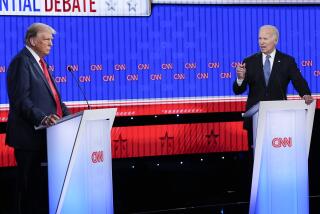Odd Man Out
- Share via
President Bush conceded Wednesday that global warming is a real environmental problem and that human-caused pollution worsens it. “Listen, I recognize the surface of the Earth is warmer,” Bush told reporters in Denmark, “and that an increase in greenhouse gases caused by humans is contributing to the problem.”
Finally, in the hours before the G-8 summit, he grudgingly joined the other leaders of developed nations in showing respect for the research on climate change instead of calling for more studies and appointing oil-industry lobbyists who soft-pedal scientific reports.
But the president’s new stance throws into even starker relief his refusal to join with other nations in taking substantive steps against climate change. The potential for long-term disaster, as Bush’s strange equation adds it up, isn’t equal to the importance of short-term economic protection.
Instead of capping carbon dioxide emissions, Bush wants the G-8 nations to invest in alternatives to fossil fuels. He should do both; companies under regulatory mandate to stem environmental damage typically respond with technological breakthroughs.
The president remains the odd man out in global environmental affairs, especially compared with Gov. Arnold Schwarzenegger, who made an international splash over the weekend with a bylined article in London’s Independent newspaper that called for stronger action against global warming. Bush appeared isolated from world opinion and from a progressive Republican outlook at home.
Nor was it diplomatic of the president to refer to his let’s-all-share-technology proposal as the “post-Kyoto era,” as though the international agreement to combat global warming hadn’t taken effect in February. The U.S. was not among the 141 nations that signed on, even though it is the world’s biggest emitter of greenhouse gases.
Ranked second, though, is China, and this is where Bush has been unfairly ignored on his biggest complaint about the Kyoto Protocol. Developing nations were exempted from emission reductions, no matter how bad their pollution might be. China, where greenhouse-gas emissions are quickly rising, could soon eclipse the U.S. as the top global-warming polluter. If it goes ahead with construction of dozens of coal-fired plants, the added pollution could outweigh measures by other nations to cut back.
With gridlocked cars replacing bicycles as primary transportation, and Chinese oil company CNOOC Ltd. bidding to buy Unocal Corp., China looks less like an underdeveloped backwater and more like an industrialized nation ready for the big leagues. Its game should include commitments to long-term caps on carbon dioxide.
That doesn’t excuse the more prosperous U.S., with a far smaller population than China and higher pollution output, from responsibility to lead instead of lagging behind with hopeful talk of voluntary cutbacks.
China, along with India and Brazil, two other big greenhouse-gas polluters, will have representatives at the G-8 meeting, and British Prime Minister Tony Blair was expected to push for more emission controls in China as well as the United States. If Blair succeeds, Bush will have no more excuses for his “post-Kyoto” rhetoric.
More to Read
Get the L.A. Times Politics newsletter
Deeply reported insights into legislation, politics and policy from Sacramento, Washington and beyond. In your inbox twice per week.
You may occasionally receive promotional content from the Los Angeles Times.









